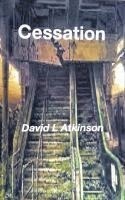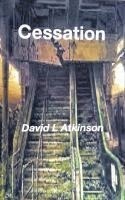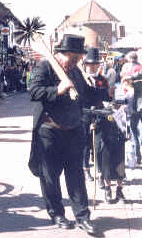David L. Atkinson's Blog, page 119
May 12, 2014
Writing - No Tuesday Recipe!!! - Cessation instead
Circumstances dictated that this week I didn't do any home cooking so rather than make something up or reflect back to a previous dish I invite you to check out the Recipe TAB yourselves.
Instead I am festooning this blog with my last completed work - 'Cessation' partly because it has sold again and partly because my current project - another Steele novel - is almost complete and I wanted to refresh memories as to other things that I've done.

The story is a speculative journey into a possible future that may lie ahead of us all. There is evidence that such a future may not be impossible. We have been warned that unless we increase the ability to produce electricity there could be power cuts in the next ten years. Our modern day lives are permeated through with the need for electricity and its production.
Although Cessation could be categorised as a dystopian story I find that rather a negative word and the purpose of writing the tale is to allow elements of hope in a seemingly desperate situation.
The story begins in 2023 a couple of years after the lights go out for the last time. Our group of survivors are thrown together on a farm in the low Pennines north of the M62 motorway and within striking distance of a number of northern towns which could prove useful for supplies. Initially the group is small and live on a farm called Serendipity but as time passes the size of the group waxes and wanes for a variety of reasons.
Also available at all major retailers and on
www.completelynovel.comwww.amazon.co.ukwww.amazon.comhttps://www.smashwords.com/books/view/384215
search under the title or David L Atkinson
God Bless
Instead I am festooning this blog with my last completed work - 'Cessation' partly because it has sold again and partly because my current project - another Steele novel - is almost complete and I wanted to refresh memories as to other things that I've done.

The story is a speculative journey into a possible future that may lie ahead of us all. There is evidence that such a future may not be impossible. We have been warned that unless we increase the ability to produce electricity there could be power cuts in the next ten years. Our modern day lives are permeated through with the need for electricity and its production.
Although Cessation could be categorised as a dystopian story I find that rather a negative word and the purpose of writing the tale is to allow elements of hope in a seemingly desperate situation.
The story begins in 2023 a couple of years after the lights go out for the last time. Our group of survivors are thrown together on a farm in the low Pennines north of the M62 motorway and within striking distance of a number of northern towns which could prove useful for supplies. Initially the group is small and live on a farm called Serendipity but as time passes the size of the group waxes and wanes for a variety of reasons.
Also available at all major retailers and on
www.completelynovel.comwww.amazon.co.ukwww.amazon.comhttps://www.smashwords.com/books/view/384215
search under the title or David L Atkinson
God Bless
Published on May 12, 2014 12:13
May 11, 2014
Writing - The Biter Bit

Serialised on VG:
http://venturegalleries.com/serial/i-was-warned-off-in-no-uncertain-terms/
Patrick A Steele, accountant turned vengeful Robin Hood, is off on his crusades once again. He has constructed a role that sees him trying to right the wrongs and inadequacies of the legal system in the UK. His experiences as a child and even through higher education have equipped Patrick with abilities that realistically only have value in the field of rough justice.
Everything seems fine in his life until he is drawn into trying to solve the problem of lawless youths that are targeting tourists in the City of York. He enlists the help of his two colleagues from Japan, Takuo Sumisu and Naomi Kobayashi, and with one of his own staff they head off to identify and eradicate the source of the problem. All is proceeding as planned until there is a knifing and one of the team is shot!
The action then migrates across France and eventually to Le Marche in eastern Italy where it seems to have been brought to a successful conclusion until the team return home!
Also available at all major retailers and on
www.completelynovel.comwww.amazon.co.ukwww.amazon.com
https://www.smashwords.com/books/view/133406
search under the title or David L Atkinson
God Bless
Published on May 11, 2014 12:06
May 10, 2014
Writing - 10 things we didn't know last week
Another week passes by and more strange and amusing facts have hit our screens.

1. People are more likely to co-operate with you if you give them something warm to hold.
------------------------------
2. AM radio signals interfere with some birds' internal compasses.
------------------------------

3. The nose of a Tyrannosaur nicknamed "Pinocchio Rex" was 35% longer than snouts of other dinosaurs of its size.
--------------------------------------
4. Men whose dating profile pictures are taken outdoors on a sunny day with trees in the background are most popular.
--------------------------------------
5. Cases of rickets have risen fourfold in the last 15 years as sunscreen has increased in popularity.
-------------------------------------
[image error]
6. 17% of Britons would be willing to have sex with a robot.
-------------------------------------
7. Pets are banned from public transport in Dubai, apart from service dogs.
-------------------------------------
8. In 1987 the Economist had an Apple Mac in the corner of the office but still relied on pen and pencil to draw up a map of the Channel Tunnel.
-------------------------------------
[image error]
9. The Black Death improved public health in subsequent centuries, although no-one knows the exact reason.
-------------------------------------
[image error]
10. New Yorkers don't call their daughters Brooklyn but in 39 US states it is now the most common female baby name beginning with B.
-------------------------------------
God Bless

1. People are more likely to co-operate with you if you give them something warm to hold.
------------------------------
2. AM radio signals interfere with some birds' internal compasses.
------------------------------

3. The nose of a Tyrannosaur nicknamed "Pinocchio Rex" was 35% longer than snouts of other dinosaurs of its size.
--------------------------------------
4. Men whose dating profile pictures are taken outdoors on a sunny day with trees in the background are most popular.
--------------------------------------
5. Cases of rickets have risen fourfold in the last 15 years as sunscreen has increased in popularity.
-------------------------------------
[image error]
6. 17% of Britons would be willing to have sex with a robot.
-------------------------------------
7. Pets are banned from public transport in Dubai, apart from service dogs.
-------------------------------------
8. In 1987 the Economist had an Apple Mac in the corner of the office but still relied on pen and pencil to draw up a map of the Channel Tunnel.
-------------------------------------
[image error]
9. The Black Death improved public health in subsequent centuries, although no-one knows the exact reason.
-------------------------------------
[image error]
10. New Yorkers don't call their daughters Brooklyn but in 39 US states it is now the most common female baby name beginning with B.
-------------------------------------
God Bless
Published on May 10, 2014 11:54
May 9, 2014
Writing - Longevity of the written word
As I get older my interest in the past deepens. I don't believe that is a unique tendency rather a human one. The value of history of course is not just looking back for nostalgia's sake but to actually examine previous events and reflect forward to aid development of society in the future.
I was thrust into this train of thought by an article in the BBC History magazine which was about Elizabeth I war on the Catholic church. You may wonder how that has any relevance to writing but it is the longevity of books that tweaked my interest.
[image error]Queen from 1558 - 1603
In 1828 at Rushton Hall a book was discovered by builders which led to the discovery of a secret room containing a bundle of papers and books that belonged Sir Thomas Tresham a Catholic gentleman who lived during the reign of the Virgin Queen. At the time of discovery those papers and books were around 250 years old.
Reflect forward and consider ebooks and their longevity. If we publish only in the electronic form where and how long will those books be kept? The answer possibly is in cyberspace forever but we all know that situations change. Things happen and cyberspace is not infinite. We can't wrap an ebook and seal it inside a secret room. I like the fact that there are the concrete realities of the stories I write, this may be old-fashioned but it feels good to hold the books.

So much has been learnt about our past from volumes and manuscripts that have been unearthed over the years if everything ends up in the electronic ether how will that happen? In my last novel Cessation, I speculate the demise of power, what would happen to our ebooks then?
I would recommend that we always have at least one paper copy of our works.
God Bless
I was thrust into this train of thought by an article in the BBC History magazine which was about Elizabeth I war on the Catholic church. You may wonder how that has any relevance to writing but it is the longevity of books that tweaked my interest.
[image error]Queen from 1558 - 1603
In 1828 at Rushton Hall a book was discovered by builders which led to the discovery of a secret room containing a bundle of papers and books that belonged Sir Thomas Tresham a Catholic gentleman who lived during the reign of the Virgin Queen. At the time of discovery those papers and books were around 250 years old.
Reflect forward and consider ebooks and their longevity. If we publish only in the electronic form where and how long will those books be kept? The answer possibly is in cyberspace forever but we all know that situations change. Things happen and cyberspace is not infinite. We can't wrap an ebook and seal it inside a secret room. I like the fact that there are the concrete realities of the stories I write, this may be old-fashioned but it feels good to hold the books.

So much has been learnt about our past from volumes and manuscripts that have been unearthed over the years if everything ends up in the electronic ether how will that happen? In my last novel Cessation, I speculate the demise of power, what would happen to our ebooks then?
I would recommend that we always have at least one paper copy of our works.
God Bless
Published on May 09, 2014 10:08
May 8, 2014
Writing - Time to sign off
As I have been reporting recently I have started writing letters, by hand with a fountain pen, encouraged by fellow scribe Bert Carson. In my last letter to Bert I brought up the issue of whether handwriting and signing documents will eventually peter out. Image my surprise when I found the article below.
Is a signature still useful?

You might have spent years perfecting its every contour. Or you might just scrawl a desultory squiggle to show you're much too busy for such self-indulgence.
Either way, you have a signature. It's there on your passport, your debit cards and your driving licence - as much a part of your bureaucratic identity as your date of birth or your National Insurance or Social Security number.
Although perhaps not forever.
The signature is in retreat. Chip and Pin, contactless payments, biometrics - all make it theoretically redundant. All, say advocates, are safer, more secure and harder to forge.
In the digital world, swathes of young people barely use cursive script, let alone a signature, argues Brett King, chief executive of mobile app-based debit account Moven. There are far more secure ways to prevent fraud. Therefore it's time to move on, he believes.
"The signature is an artefact we don't need any more," says King. "It's a hold-over from many years ago. I think there will be a natural evolution where the signature dies a slow death."
And yet. There's something profoundly satisfying about marking your own unique inscription.
It's the one satisfying flourish of personality you're allowed at the foot of a neatly-typed business letter. It's the scribble in a greetings card that shows a loved one is thinking of you. It's the autograph you first honed as a teenager in the demi-expectation you'd become a pop star or a sporting hero. Or writer!
What's more, signatures go back a long way in human culture. A Sumerian clay tablet from around 3100 BC is marked with the name of the scribe Gar Ama. The Romans used signatures as far back as the reign of Valentinian III in 439. El Cid left one in 1069, but it wasn't until the British Houses of Parliament passed the Statue of Frauds in 1677 - which required that contracts be signed - that the signature became the commonly-understood acclamation of assent.
Already the alternatives are well-established. In 2000 President Bill Clinton signed the first US bill into law electronically. Now Obama has an Autopen stylus which he has used to imprint his signature on to legislation while on holiday in Hawaii. Similarly, the author Margaret Atwood created a device called a LongPen which allows her to remotely autograph books for fans.
All this has led to fears that the art of the signature is dying out.
The Canadian media has fretted that children are simply printing their name rather than signing because of the dominance of digital. The US Common Core State Standards Initiative, which aims to ensure consistency in US education, makes no mention of handwriting, although seven states - California, Idaho, Indiana, Kansas, Massachusetts, North Carolina and Utah - have moved to keep cursive mandatory.
Across the Atlantic it's a different story. The National Curriculum due to take effect in England from September 2014 requires pupils to be taught "fluent, legible and, eventually, speedy handwriting".

It seems that among educationalists there is a greater attachment to the signature than simply making marks on paper. Children begin to develop the concept of signature when they produce their first birthday and Christmas cards for parents. They want to make their mark and from that moment onwards they develop their own signature. I can remember developing my own and it was over a number of years. Like many skills it evolves and I think the reason for it to be maintained is summed up below.
"It's not like a Pin," Mike Allen, a forensic document analyst with 30 years experience. "It's someone making their mark and saying 'I agree with this.' It's not about being safer - the value of it is that it's you."
So before you join the digital bandwagon (is that a contradiction in terms?) remember that your signature is part of who you are as a person.
In my discussions with Bert Carson we have agreed that handwriting is an art-form and should be practised. At the moment there aren't that many of us who are writing but it would be great if more people did. If you want to take part get back to me.
God Bless
Is a signature still useful?

You might have spent years perfecting its every contour. Or you might just scrawl a desultory squiggle to show you're much too busy for such self-indulgence.
Either way, you have a signature. It's there on your passport, your debit cards and your driving licence - as much a part of your bureaucratic identity as your date of birth or your National Insurance or Social Security number.
Although perhaps not forever.
The signature is in retreat. Chip and Pin, contactless payments, biometrics - all make it theoretically redundant. All, say advocates, are safer, more secure and harder to forge.
In the digital world, swathes of young people barely use cursive script, let alone a signature, argues Brett King, chief executive of mobile app-based debit account Moven. There are far more secure ways to prevent fraud. Therefore it's time to move on, he believes.
"The signature is an artefact we don't need any more," says King. "It's a hold-over from many years ago. I think there will be a natural evolution where the signature dies a slow death."
And yet. There's something profoundly satisfying about marking your own unique inscription.
It's the one satisfying flourish of personality you're allowed at the foot of a neatly-typed business letter. It's the scribble in a greetings card that shows a loved one is thinking of you. It's the autograph you first honed as a teenager in the demi-expectation you'd become a pop star or a sporting hero. Or writer!
What's more, signatures go back a long way in human culture. A Sumerian clay tablet from around 3100 BC is marked with the name of the scribe Gar Ama. The Romans used signatures as far back as the reign of Valentinian III in 439. El Cid left one in 1069, but it wasn't until the British Houses of Parliament passed the Statue of Frauds in 1677 - which required that contracts be signed - that the signature became the commonly-understood acclamation of assent.
Already the alternatives are well-established. In 2000 President Bill Clinton signed the first US bill into law electronically. Now Obama has an Autopen stylus which he has used to imprint his signature on to legislation while on holiday in Hawaii. Similarly, the author Margaret Atwood created a device called a LongPen which allows her to remotely autograph books for fans.
All this has led to fears that the art of the signature is dying out.
The Canadian media has fretted that children are simply printing their name rather than signing because of the dominance of digital. The US Common Core State Standards Initiative, which aims to ensure consistency in US education, makes no mention of handwriting, although seven states - California, Idaho, Indiana, Kansas, Massachusetts, North Carolina and Utah - have moved to keep cursive mandatory.
Across the Atlantic it's a different story. The National Curriculum due to take effect in England from September 2014 requires pupils to be taught "fluent, legible and, eventually, speedy handwriting".

It seems that among educationalists there is a greater attachment to the signature than simply making marks on paper. Children begin to develop the concept of signature when they produce their first birthday and Christmas cards for parents. They want to make their mark and from that moment onwards they develop their own signature. I can remember developing my own and it was over a number of years. Like many skills it evolves and I think the reason for it to be maintained is summed up below.
"It's not like a Pin," Mike Allen, a forensic document analyst with 30 years experience. "It's someone making their mark and saying 'I agree with this.' It's not about being safer - the value of it is that it's you."
So before you join the digital bandwagon (is that a contradiction in terms?) remember that your signature is part of who you are as a person.
In my discussions with Bert Carson we have agreed that handwriting is an art-form and should be practised. At the moment there aren't that many of us who are writing but it would be great if more people did. If you want to take part get back to me.
God Bless
Published on May 08, 2014 10:30
May 7, 2014
Poetry Thursday 109 - Give with one hand and a lovely walk
On occasions life takes twists and turns that seem to be linked by fate, whatever that means. This week has been a little like that for me but all seems well at the moment. Poetry reflects how things go and here goes.
[image error]
Given and Taken Away
Why is it so that when all is wellsomething incurs inexplicably rudeto plunge ones good feelings to the depths of hellnegating all that was good?
The prize-winning sense of euphoriahas you floating in the glorious firmamentbut lurking in the background is a plethoraof pitfalls preparing disappointment.
Is it wrong to expect good thingsto happen making your world glowand not to worry that somethingwill come along to interrupt the happy flow?
Or should we perhaps be gratefuland identify what is beneficialthat makes our lives more meaningfuland outshines the superficial?©David L Atkinson May 2014

New Miller Dam
A bright busy spring morningglistening on the gently stirring dammed watersbusy with relaxed people holidaying.Feathered friends performing around and on their watery stage.A pastoral feast littered with ice cream and excited rugrats cacophony.But idyllic.
Momentary relief from the daily grindfor young and old alike.Cameras clicking, whirring, noisily tryingto capture forever the God given scenario.Picnics, bluebells, woodland a soft experience occasionally punctuatedby barking dogs and other happy waves.A life’s day.©David L Atkinson May 2014
God Bless
[image error]
Given and Taken Away
Why is it so that when all is wellsomething incurs inexplicably rudeto plunge ones good feelings to the depths of hellnegating all that was good?
The prize-winning sense of euphoriahas you floating in the glorious firmamentbut lurking in the background is a plethoraof pitfalls preparing disappointment.
Is it wrong to expect good thingsto happen making your world glowand not to worry that somethingwill come along to interrupt the happy flow?
Or should we perhaps be gratefuland identify what is beneficialthat makes our lives more meaningfuland outshines the superficial?©David L Atkinson May 2014

New Miller Dam
A bright busy spring morningglistening on the gently stirring dammed watersbusy with relaxed people holidaying.Feathered friends performing around and on their watery stage.A pastoral feast littered with ice cream and excited rugrats cacophony.But idyllic.
Momentary relief from the daily grindfor young and old alike.Cameras clicking, whirring, noisily tryingto capture forever the God given scenario.Picnics, bluebells, woodland a soft experience occasionally punctuatedby barking dogs and other happy waves.A life’s day.©David L Atkinson May 2014
God Bless
Published on May 07, 2014 13:43
May 6, 2014
Writing - Spring Madness
Throughout the ages the disappearance of winter and onset of better weather and a new growing season has generated a lightening of the spirit which humans have signified in a variety of ways, not all of which could be described as a 'celebration'.
Here are some examples.
Stilton Cheese Rolling
[image error]
An "ancient annual tradition" invented about 50 years ago to revitalise local businesses attracted about 2,000 people to a Cambridgeshire village on Monday.The cheese-rolling competition is a May Day Bank Holiday Monday tradition held in Stilton - the village which gave the cheese its name.
Teams roll wooden blocks resembling the cheese through the streets.
Cooper's Hill Cheese Rolling and Wake
[image error]
A 9lb round of Double Gloucester Cheese is rolled down Cooper's Hill in Gloucestershire. It is believed that something similar had been happening on the site since pagan times. It is truly international. Last year a man from USA and another from Japan won two of the four races.
Shin Kicking
[image error]
Moving away from cheese we have shin kicking or hacking contests found in the Cotswolds. Two combatants wearing white coats (representing shepherds smocks!) grab each other by the collar and proceed to try and kick each other's shins. Success depends on the ability to bear pain and agility!!!
Sweep's Festival

This takes place in Rochester in Kent. It began because chimney sweeps welcomed the fine weather which enabled them to start their work.
Maypole Dancing

This is a tradition in most places around the UK and is followed by children in primary schools and in churches. The custom goes back to medieval times and may have started in Germany.
I could go on but brevity demands that I simply list other activities:-
May Day LiftingCrowning the May Queen + ParadesMay Day GarlandsEarly morning washing - young girls used to wash their faces in early morning dew as it was supposed to be beneficial to the complexion.
Obviously, if you want to find out more then you need to carry out some research. As writers I'm sure we are familiar with that.
News
Amazon have now made it possible to shop via Twitter. It is still necessary to pay through the Amazon websites but by using special hashtags - #amazoncart for the USA and #amazonbasket for the UK - you can add items to your shopping basket. You need to reply to a tweet containing an item and an Amazon link and use the appropriate hashtag.
For us writers it could make buying our works more simple. I'm going to try it! Here is an example,
Cessation - want to buy add #amazonbasket to your reply to this tweet.
It needs work!!!!
On VG today:
http://venturegalleries.com/serial/they-didnt-expect-to-find-a-lot-and-found-nothing/
God Bless
Published on May 06, 2014 11:35
May 5, 2014
Tuesday Recipe - Aloo Keema - my version
 Aloo Keema
Aloo Keema
This is a variation on a theme. We've all probably eaten or seen someone eating a keema curry which is minced beef and peas, perhaps an over-simplification but you get the idea. This is a slightly more bulked out version that doesn't need rice or chapatis but as I hadn't much left I served the dish up as above.By using minced turkey, instead of the more traditional chicken, beef or lamb, this meal is much leaner and I didn't overdo the butter. Honest!
The full recipe is on the TAB
Published on May 05, 2014 12:05
May 4, 2014
Writing - Inspiring writers
[image error]Jules Verne (1828 - `905)
A real foot in the door of being able to claim that he was one of the first SF writers. A French novelist, poet, and playwright best known for his adventure novels and his profound influence on the literary genre of science fiction.
Which child has not read the books or seen the films of 20 000 Leagues Under the Sea, Journey to the Centre of the Earth and Around the World in 80 Days? A true set of classics that have been translated, reprinted and re-filmed countless times. In fact the Frenchman wrote more than 70 novels and is one of the most translated authors of all time.
Verne is also a hero of the keyboard playing songwriter, Rick Wakeman
[image error]
Wakeman says of Verne,'I love someone who sticks at what they believe in, regardless of what everyone says. My favourite saying is "Success is buried in the garden of failure" - and Verne just dug until he found it'
Really this is the case for all writers who have yet to achieve great success and mirrors the saying that 'success is 1% inspiration and 99% perspiration'If you are a writer you will know the drug-like quality of the art that keeps driving you on to keep writing irrespective of any material gain. You will also understand the futility in trying to stop!
And some of Wakeman's words from his 'Journey to the Centre of the Earth'
The Journey
By horse, by rail, by land, by sea, our journey starts
Two men incensed by one man's journey from the past
In Iceland, where the mountain stood with pride
They set off with their guide
To reach the mountain side
Roped as one for safety through the long descent
Into the crater of volcanic rock they went
Look up from our telescopic lens,
One star for us to share,
We continue on our prayer.
Crystals of opaque quartz, studded limpid tears,
Forming magic chandeliers, lighting blistered galleries.

God Bless
Published on May 04, 2014 12:42
May 3, 2014
Writing - 10 things we didn't know last week
There are even more strange and amusing facts this week.
[image error]
1. There can be up to 30 security features on a single bank note.
-----------------------------------------
2. The code A113 is implanted in every Pixar movie.
Its all very well telling us its there but what is it for?
------------------------------------------

3. Pennsylvania is the most linguistically rich US state - it has five dialects, compared with the typical two or three.
----------------------------------------
4. Mice don't like the way men smell - the stress is the equivalent of a three minute swim - but the scent of a woman is okay.
I'm not fond of the way they smell either!!
-------------------------------------------
5. The Wiltshire village of Amesbury is the oldest continuously inhabited settlement in Britain.
-------------------------------------------
6. Divorce in older couples is more likely when the wife falls ill.
-------------------------------------------

7. Petrol is free for people in Turkmenistan - although the 120 litre free allowance will be phased out soon.
Don't tell everyone or they'll all want some!
------------------------------------------[image error]
8. You can smell someone's gender.
Should that be finished with 'if you get close enough?'
--------------------------------------
9. Southern Mexico has sensors that give residents of Mexico City two minutes notice that an earthquake is on the way - seismic waves travel at 7,000 mph (11265 km/h).
--------------------------------------
[image error]
10. A key character in Booker Prize winner Hilary Mantel's latest collection appeared to her in a hallucination while she was high on morphine.
Having received yet another rejection slip this week perhaps I should turn to morphine!
God Bless
[image error]
1. There can be up to 30 security features on a single bank note.
-----------------------------------------
2. The code A113 is implanted in every Pixar movie.
Its all very well telling us its there but what is it for?
------------------------------------------

3. Pennsylvania is the most linguistically rich US state - it has five dialects, compared with the typical two or three.
----------------------------------------

4. Mice don't like the way men smell - the stress is the equivalent of a three minute swim - but the scent of a woman is okay.
I'm not fond of the way they smell either!!
-------------------------------------------
5. The Wiltshire village of Amesbury is the oldest continuously inhabited settlement in Britain.
-------------------------------------------
6. Divorce in older couples is more likely when the wife falls ill.
-------------------------------------------

7. Petrol is free for people in Turkmenistan - although the 120 litre free allowance will be phased out soon.
Don't tell everyone or they'll all want some!
------------------------------------------[image error]
8. You can smell someone's gender.
Should that be finished with 'if you get close enough?'
--------------------------------------
9. Southern Mexico has sensors that give residents of Mexico City two minutes notice that an earthquake is on the way - seismic waves travel at 7,000 mph (11265 km/h).
--------------------------------------
[image error]
10. A key character in Booker Prize winner Hilary Mantel's latest collection appeared to her in a hallucination while she was high on morphine.
Having received yet another rejection slip this week perhaps I should turn to morphine!
God Bless
Published on May 03, 2014 11:26



